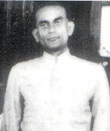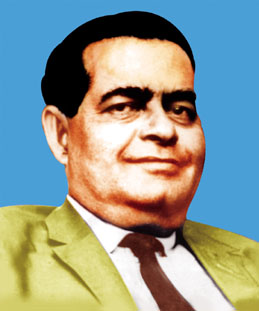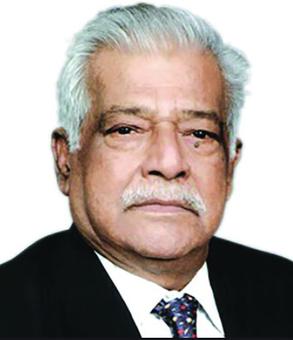
Sheikh Mujibur Rahman, popularly known by the honorific prefix Bangabandhu was a Bengali politician, revolutionary, statesman, activist and diarist, who served as the President of Bangladesh from April 1971 to January 1972 and again from January 1975 till his assassination in August 1975, and Prime Minister from January 1972 to January 1975. Mujib successfully led the Bangladeshi independence movement and restored the Bengali sovereignty after over two centuries following the Battle of Plassey in 1757, for which he is honoured as the 'Father of the Nation' in Bangladesh. In 2011, the fifteenth constitutional amendment in Bangladesh referred to Sheikh Mujib as the Father of the Nation who declared independence; these references were enshrined in the fifth, sixth, and seventh schedules of the constitution. His Bengali nationalist ideology, socio-political theories, and political doctrines are sometimes called Mujibism.
Independence of Bangladesh was declared on 26 March 1971, celebrated as Independence Day, from Pakistan. The Independence Day of Bangladesh is celebrated on 26 March when Sheikh Mujibur Rahman declared the independence of Bangladesh. The Bangladesh Liberation War started on 26 March and lasted till 16 December 1971 which is celebrated as Victory Day in Bangladesh. There is a dispute along partisan line on who declared the Independence of Bangladesh. The Awami League claim Sheikh Mujibur Rahman while the Bangladesh Nationalist Party claim it was Ziaur Rahman.

Khondaker Mostaq Ahmad was a Bangladeshi politician. He was the fourth president of Bangladesh from 15 August to 6 November 1975, after the assassination of Sheikh Mujibur Rahman. He was involved in the assassination of Bangabandhu Sheikh Mujibur Rahman on 15 August 1975. He took on the role of president immediately after the assassination, praised the assassins as "sons of the sun" and put cabinet ministers loyal to Sheikh Mujibur Rahman in jail.

Tajuddin Ahmad was a Bangladeshi politician and statesman. He led the Provisional Government of Bangladesh as its prime minister during the Bangladesh Liberation War in 1971 and is regarded as one of the most instrumental figures in the birth of Bangladesh.
The Agartala Conspiracy Case was a sedition case in Pakistan during the rule of Ayub Khan against Awami League, brought by the government of Pakistan in 1968 against Sheikh Mujibur Rahman, the then leader of the Awami League and East Pakistan, and 34 other people.

Mirza Ahmad Ispahani (1898–1986) was a Perso-Bengali businessman based in Chittagong and the patriarch of the Ispahani family. He was the founder of Orient Airways and the first chairman of Pakistan International Airlines (PIA). He was the chairman of Ispahani Group.

The first president of Bangladesh, Sheikh Mujibur Rahman, and most of his family were killed during the early hours of 15 August 1975 by a group of young Bangladesh Army personnel who invaded his Dhanmondi 32 residence as part of a coup d'état. Minister of Commerce Khondaker Mostaq Ahmad immediately took control of the government and proclaimed himself president. The assassination marked the first direct military intervention in Bangladesh's civilian administration-centric politics. 15 August is National Mourning Day, an official national holiday in Bangladesh.

Muhammad Mansur Ali was a Bangladeshi politician who was a close confidant of Sheikh Mujibur Rahman, the founding leader of Bangladesh. A senior leader of the Awami League, Mansur also served as the Prime Minister of Bangladesh in 1975.

Ataur Rahman Khan was a Bangladeshi lawyer, politician and writer, and served as Chief Minister of East Pakistan from 1 September 1956 – March 1958, and as the Prime Minister of Bangladesh from 30 March 1984 to 9 July 1986.

Tofazzal Hossain, popularly known as Manik Miah, was a Pakistani Bengali journalist and politician. He served as the founding editor of The Daily Ittefaq. He wrote the editorial Rajnoitik Moncho. Most of his journalists were considered leftist, as Miah followed the pattern of Awami League. According to journalist and editor of Shongbad Bozlur Rahman, Awami activists followed his editorial more than any actual decision of a meeting. He was a close associate of the founder of Bangladesh, Sheikh Mujibur Rahman.

The independence of Bangladesh was declared on 26 March 1971, at the onset of the Bangladesh Liberation War by Bangabandhu Sheikh Mujibur Rahman; the following day the declaration was broadcast by Major Ziaur Rahman in a radio broadcast. On 10 April, the Provisional Government of Bangladesh issued a proclamation on the basis of the previous declaration and established an interim constitution for the independence movement.

The 1969 East Pakistan uprising was a democratic political uprising in East Pakistan. It was led by the students backed by various political parties such as the Awami League and National Awami Party and specially their student wings against Muhammad Ayub Khan, the president of Pakistan in protest of the military rule, political repressions, Agartala Conspiracy Case and the incarceration of Sheikh Mujibur Rahman and other Bengali nationalists.

Mustafizur Rahman Siddiqi was a Bangladeshi entrepreneur, politician and diplomat. He set up a number of manufacturing and finance businesses during the 1960s. He played a prominent role in the Bangladesh Liberation War of 1971, organising resistance within Bangladesh and travelling to the US to represent the Bangladesh Government in exile. He became Minister of Commerce and Foreign Trade in the newly formed state, and ambassador to the US and Mexico.

Abdul Hamid Khan Bhashani, often shortened as Maulana Bhashani, was a Bengali politician. His political tenure spanned the British colonial India, Pakistan and Bangladesh periods. Maulana Bhashani was popularly known by the honorary title Mozlum Jananeta for his lifelong stance advocating for the poor. He gained nationwide mass popularity among the peasants and helped to build the East Pakistan Peasant Association. Owing to his political leaning to the left, often dubbed Islamic Socialism, he was also called 'The Red Maulana'.He is considered as one of the main pillars of Bangladeshi independence of 1971.
Yar Mohammad Khan was one of the founders and the first treasurer of the Bangladesh Awami League, the main political party that eventually led Bangladesh's struggle for independence against the West Pakistan regime.

The Constituent Assembly of Bangladesh was the constituent assembly of Bangladesh. It was the country's provisional parliament between 1971 and 1973. In 1972, it drafted and adopted the Constitution of Bangladesh. The assembly was dominated by the Awami League, with a minority being independent lawmakers.
Mashiur Rahman (1920–1971) was a Bangladeshi lawyer and politician, a member of the East Bengal Legislative Assembly and cabinet minister in the East Pakistan government of Ataur Rahman Khan. He was instrumental in the founding of the Bangladesh Awami League and in the Bengali Language Movement, and supported Sheikh Mujibur Rahman.

Khandakar Mohammad Obaidur Rahman was a Bangladeshi politician. He was a member of the Jatiya Sangsad in 1973 representing Bangladesh Awami League and in 1979, 1996 and 2001 representing the Bangladesh Nationalist Party (BNP).
The non-cooperation movement of 1971 was a historical movement in then East Pakistan by the Awami League and the general public against the military government of Pakistan in March of that year. After the announcement of the suspension of the session of the National Assembly of Pakistan on 1 March, the spontaneous movement of the people started, but officially on the call of Sheikh Mujibur Rahman, the non-cooperation movement started on 2 March and continued until 25 March. The movement lasted for a total of 25 days. The main objective of this movement was to ensure the autonomy of East Pakistan from the central government of Pakistan. During this period, the control of the central government of West Pakistan over the civilian administration of East Pakistan was almost non-existent. At one stage of the movement, the whole of East Pakistan, except the cantonments, was practically under the command of Sheikh Mujibur Rahman.














